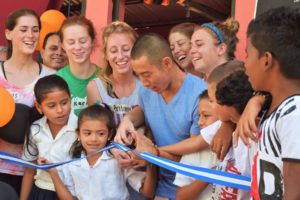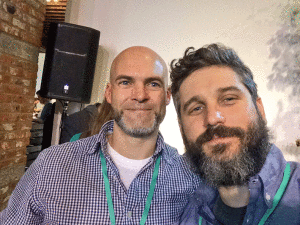
2007 alumnus Shin Fujiyama inaugurates a school built by his nonprofit, Students Helping Honduras, which he started at UMW. SHH has built 55 schools in the impoverished country, which is currently on lockdown. While much of his staff have been evacuated, Fujiyama stayed behind in Honduras to care for 24 orphaned children. Photo courtesy of SHH.
Phoning it in isn’t an option for Shin Fujiyama ’07. At UMW, he threw himself into every assignment, task and responsibility – from serving hungry students in Seacobeck to organizing a thousand-person walkathon.
Now, living in Honduras in the midst of a global pandemic, Fujiyama is focused on rescuing the nonprofit he started at Mary Washington, Students Helping Honduras (SHH). While his American and European staff were evacuated due to the coronavirus threat, Fujiyama stayed behind to care for 24 orphaned kids at a children’s home he founded. To keep his dream alive of building schools across the impoverished country, he is relying on support from former professors and fellow alumni.
“My conviction to see this through has always been strong,” said Fujiyama, who started SHH 14 years ago with sister Cosmo, then a student at William & Mary. Since graduation from UMW, he’s lived in Honduras and oversees the nonprofit, which has over 50 chapters nationwide and has seen thousands of volunteers over the years.
Then came COVID-19.
“There’s a chance Honduras will face food shortages, civil unrest and massive outbreaks of the virus,” he said. “We need to confront those challenges together.” Read more.





